- You are one of only a very few active scholars of contemporary performance of Greek tragedy in Japan today, but I heard that you actually started out studying Shakespeare.
- That’s correct. In college I majored in English literature and was a member of the Shakespeare study group. After I graduated from college in 1982 I went to Britain to study and entered the diploma course of Canterbury University. Shakespeare was the only thing I had any proficiency in and so I felt lucky when I got the Rotary scholarship to study in Britain. But, somewhere along the way I began to think that English and Shakespeare didn’t really suit me. I liked Macbeth and Titus Andronicus but I had a hard time grasping the colonialist way of thinking and the racist language used in the works like Tempest and The Merchant of Venice and I could never sit through a whole performance of them. So, when I returned to Japan I quit studying Shakespeare and began to look for something different for my career.
- How did you get from there to your encounter with Greek tragedy?
- Before I returned to Japan from the U.K. I spent about two weeks traveling in Greece, and that was the spark. During that trip I saw several plays. That experience got me enthralled with the chorus in Greek theatre. When I had read the Greek plays many years earlier, they were so difficult and I had not found any interest in them at all. But, seeing them performed in Greece with a chorus of 12 to 15 chanting and dancing on a circular stage of 20 meters diameter, I found an odd, new interest in it. That was what first prompted me to take up the study of Greek tragedy. And by chance, that trip to Greece happened to be at the same time as the first performance of Yukio Ninagawa’s production of Medea in Athens (1983) and I was able to see that performance. I somewhat remember wondering that a Japanese director would come all the way to Greece to perform Greek tragedy.
- Does that mean that you didn’t begin your study of Greek until after you came back from Britain? I would imagine that a very difficult new study to take on at that point.
- I knew that I wanted to study Greek tragedy no matter what, so I began looking for a graduate school that taught it. At that time in Japan there wasn’t such a course to be found, so I decided to enter the drama course of graduate school of Waseda University. Since I didn’t know Greek, I had to take the entrance exam in English. I began studying in the course of ancient Greek language, but no matter how long I studied, I wasn’t even able to make the simplest of greetings. I became frustrated and finally realized that it was Modern Greek that I wanted to study. I thought I would go to study at the only one private institute in Tokyo teaching Modern Greek, Athenee Francais. It turned out, however, that their lessons were conducted in French! (laughs) So, I ended up going through the graduate school without really learning anything significant about Greek or Greek tragedy, but I was fortunate when I went on for my doctor’s degree I passed an exam for a Greek government scholarship to study in Greece.
- It seems as if it was your fate to study Greek tragedy (laughs).
- Perhaps that was so (laughs). Anyway, I didn’t really begin to study Greek until I went to Greece, and there I began studying both the written “purified” Greek based on ancient Greek (Katharevousa) and the proper spoken modern Greek that was finalized in 1976 (Dhimotiki). That is because, up until the year I started studying, the Greek university entrance exam had to be taken in both these written and spoken Greek. The ancient Greek used at the time of the three great playwrights of ancient Greek tragedy and modern Greek have the same basic grammatical structure but the pronunciation and many of the rules are different. Also, all the Greek tragedies are performed today in the modern spoken language but all the critique written about the plays up until about the Second World War is published in the written Greek, so you have to learn both in order to really study the plays in performance.
- Before director Ninagawa began performing Greek tragedies using your translations, what was the situation in Japan regarding Greek play translations and performances?
- There were generally two patterns. The first was based on research studies published by researchers primarily at Tokyo University and Kyoto University in which the plays were translated into Japanese from the ancient Greek based primarily on interpretations written in German.
The other was to use the series of translation by the famous Shakespeare scholar and translator Tsuneari Fukuda that were translated into Japanese from English translations of ancient Greek. As for the English translations, I read and compared five different English translations of Oedipus Rex when I was translating it into Japanese and I found that all of them were translated quite variously. I believe that this is because the different translators were basing their translations of their own interpretations of the original texts, and so I wonder how faithful the English translation that Fukuda used was to the original ancient Greek.
Now Ninagawa seems to be mounting productions of the Greek tragedies rather regularly, but before this there were very few performances of Greek tragedy in Japan. The oldest recorded performance of Greek tragedy in Japan was an adaptation performed by the Kawakami Otojiro theatre company in 1894, but the first real performances didn’t begin until 1958, with the productions resulting from the activities of the Greek Tragedy Study Group started by students of the department of aesthetics of Tokyo University. Their productions were based on a policy of first of all translating by themselves and then trying to duplicate the original stage art and costumes as faithfully as possible, and their performances were given once a year at the outdoor music stage in Hibiya Park in Tokyo. Then in the 1970s, under the influence of French theatre such as Jean Baptiste Racine, Jean Anouilh and Jean-Paul Sartre, those who were in the theatre movement in Japan, like Keita Asari around the time he started the Gekidan Shiki theatre company, began performing re-workings of the Greek tragedies. Also, I believe the only significant productions of Greek tragedies were the experimental productions by the “Mei no Kai” mainly formed by a number of Noh and Kyogen actors. And there were also the performances of Greek tragedies that Tadashi Suzuki became famous for with his Waseda Shogekijo theatre company (present SCOT).
In all of these cases they used one of the two types of translations I mentioned earlier and then the individual directors staged of them freely based on their own references. The parts that weren’t clear to them were simply skipped over and the parts that they did want to dramatize were picked out and strung together. That style definitely made the plays easier to understand and more modern in appearance, but I don’t think they succeeded in communicating the enigmatic appeal of the original Greek plays. - Yukio Ninagawa has created very successful productions of Oedipus Rex using the Kabuki actor Somegoro Ichikawa VI (presently Koshiro Matsumoto IX) and Medea starring Mikijiro Hira (adaptation by the poet Mutsuo Takahashi). The first time you worked with Ninagawa using your own translation of a Greek tragedy was the 2002 production of Oedipus Rex. How was it that you came to do this translation from the Modern Greek?
- I was a researcher in the field of Greek drama but I had never actually translated any plays when Mr. Ninagawa asked me to do a translation, saying that there were already translations but it was difficult to understand what they were saying and impossible to stage a play from because they weren’t stage scripts. When I told him that I only knew modern Greek, he said that a translation of a modern Greek stage script would be fine. So, I decided to accept the request. The new translation had only a single aim: to communicate the atmosphere of the plays as the Greeks enjoy them today.
- What was the actual translation process like?
- First of all, with Oedipus Rex I had intended to use the stage script actually used by the National Theatre of Greece as my basic text, but there turned out to be a copyright problem, so in the end I had to use a combination of several contemporary Greek texts.
In addition to the script used by the National Theatre of Greece, I chose two more scripts that were said to be the most modernized and simple modern Greek translations. The interpretations found in these scripts are basically the same but there are still some places where they differ. When I was uncertain about the correct nuance for these differing parts, I would refer back to the ancient Greek text. Still, I found that the more modern translations I looked at, the farther I seemed to be getting away from the essence of the original, so I tried to restrict my reference material to a few sources I thought most reliable.
As for the translation process, I first do a complete translation as a first draft. Then I read it back simply as Japanese and polish the words that I think would not make good lines for a play. That becomes the second draft. At that stage I go to authoritative Japanese translations from the ancient Greek that have been published by the Iwanami Shoten publishing house and compared them to my text. When I found the parts that turn up different which I considered to be possible mistranslations on my part I go back to the modern Greek translations to verify them. If there are important parts where there definitely appears to be a difference in interpretation, I go back to the ancient Greek to check it once again. The text I have at the end of this stage is my third draft. Finally, I read it aloud to myself and see how it sounds and modify it again to get my fourth and final draft. For the first three plays I translated, I got an actor friend to read it aloud and this became the final draft.
Once the rehearsals began I would take the original Greek texts to the studio and, if the actors kept mistaking their lines at the same places, I would try to find out when necessary if it was because my translation was bad or if the actors had simply misread. If it was simply a case of misreading I would have them use the translation as it was. - Since actors have a tendency to chang the words in the direction of their own interpretation, it can be important to get them to go back to the original text, can’t it?
- It was fortunate for me that Oedipus Rex was re-staged in 2004, because at the time of the premiere (2002) I still didn’t have any idea of what the job of the translator really involved , how I should act as translator and what kind of distance I should maintain with the director and actors. By the time of the second staging in 2004 I had learned quite a bit more about the actual workings of the theatre and I was able to go about the work of reducing the 2 hour 20 minute play into one of under 2 hours as would be required for the planned Athens performances in 2004.
- Were there any words or expressions that couldn’t be translated into Japanese?
- The problem of person is considerable I believe. In Japanese there are different manners of speech depending on the age, position or the person you are talking to, and a lot of time subjects are abbreviated out of the conversation. In the case of Oedipus Rex, for example, I used the Japanese watashi for “I” when it was spoken in public situations and ore in private situations. In the case of the queen Jocasta, who was more than a dozen years older, I had her use anata for “you” in most cases when talking to her husband Oedipus, but there was only one place where I had her use omae (like a mother call for a son). I was surprised to see how that difference alone made her posture seem to change from that of wife to that of his mother. This changed the way the actress playing the part of the queen acted. She immediately appeared the mother when she spoke the word omae. When I saw the second staging of the play I realized that this choice of word had been the right one.
The problem of male and female expressions at the ends of sentences also comes into play. Mostly male translators prefer to use …yo or …da-wa or …ne if it is a woman, and as long as I was being faithful to the image of the character in my translation I wouldn’t worry about it. - Were there problems of rhythm or meter?
- There is meter in the original ancient Greek script, but it is gone in the modern Greek script. However, since there is a rhythm that I feel in the lines of the modern Greek script, I have to include that in the Japanese translation. So, I wrote the rhythm I wanted to read and hear into the Japanese lines.
- I would imagine that the translation of the Chorus parts would be quite difficult.
- Right. That is the part that required the greatest effort. When I first translated Oedipus Rex the plans were already set that it would be directed by Ninagawa with starring Mansai Nomura and there would be an Athens performance, so I worked hard to make it a translation that no one could find fault with. I worked especially hard to make the translation of the chorus sections faithful to the original. But the actors in the chorus were all real individuals and they all used different phrasing and breathed at different times when they recited the lines, so it sounded out of unison when they all recited the chorus lines together. To correct that for the second staging in 2004 I re-translated the chorus lines in a calculated way with care for meter and intonation so that anyone who recited them would breathe at the same time and phrase in the same way. You might think in the case of Japanese that there would be no problem if you reduced everything to a 7-syllable and 5-syllable meter like haiku, but if you do that in fact it becomes too patterned and the words fail to project. It seems that Ninagawa dislikes the 7-5 syllable pattern too, and he will say something like, “Say it till it becomes suffocating, even if you have to remove all the punctuation.” (laughs)
- With productions of four plays now since 2002, what do you think of Ninagawa’s Greek tragedies?
- I like the fact that he has used young actors. Because the Japanese tend to have an image of Greek tragedy as something old where honorable old actors speak lofty lines. If the plays are staged with those kinds of preconceptions, in the case of Oedipus and Jocasta, who is his wife but also his mother, it would be hard to imagine that they are a married couple with a sex life if the play is casted with actors who are too old (laughs). All the actors and actresses in Ninagawa’s productions are young and energetic. The Greek tragedies are dark and heavy stories but the stage image is actually quite bright and I think that is successfully portrayed in Ninagawa’s productions.
Regarding the question of what I think of the Greek tragedies of Ninagawa, I am the one who reads all the questionnaires that audiences fill out after the performances, and I see young people writing that they came to the theatre for the first time because they are fans Junichi Okada of the Johnnys talent office’s popular group V6 who appeared in Electra, or Tatsuya Fujiwara who starred in Orestes. This is amazing that the first theatre these young girls are seeing is Greek tragedy! (laughs) So, I think it is good that Greek tragedy is now being seen not as classical theatre but as just another genre like contemporary theatre. - The gods always make appearances at the climax of a Greek tragedy. This is something that is unfamiliar to Japanese audiences. What is the significance of the gods in Greek tragedy?
- They don’t necessarily always make appearances at the climax. There are two patterns that the appearances of the gods as follows: One is when the gods appear in human-like roles in the play like The Bacchae and Prometheus Bound. The other pattern is when they appear at the end of the play to resolve the situation, as in The Orestes or Iphigeneia in Tauris.
Concerning the beliefs at the time, there appears to have been strong belief in the gods for the first 200 years or so from the time of the establishment of the myths in 8th century B.C., but it is believed that the belief in the gods had lessened significantly by the 5th century B.C., the golden age of the tragedies. For example, Oedipus Rex begins at a time of plague, and in fact there was a serious plague at that time in history that killed about one-third of the population. Even if one believed at first that faith in the gods could save from the disease, when he sees everyone around him dying regardless of whether he had faith or not, it shakes one’s belief. At times the gods may be a source of refuge and salvation, but at other times people find themself wondering what the gods really are. These feelings come out in the plays, where you may see people expressing doubt about the validity of the words of Apollo being pronounced by a messenger of the god.
Furthermore, about twenty years after that play was first performed, came The Orestes with a line that says “Apollo was wrong,” which is a clear criticism of the gods. But, that doesn’t signify a complete loss of belief in the gods. Even though Jocasta criticizes Apollo’s prophet, she makes offerings to Apollo’s alter praying for peace of heart. And even Orestes, after criticizing Apollo, pledges to obey his words. There is clearly some ambiguity about the existence of the gods in the tragedies. But, this probably reflects the actual consciousness of the audience of the day.
Contemporary Japan is also a place where faith has weakened, but we still have the customs of praying at times like exams and praying for safe births. So, some form of belief in the gods still remains. In the same way, if we are surrounded by things beyond our comprehension and irrational and we don’t know how to cope, saying that it is the fault of the gods so that it places beyond our power. In other words, it is a fatalistic faith. In short, literally “deus ex. machina.” (laughs) - The themes that are found in the Greek tragedies are the universal themes of desire and deception that are unchanged 2500 years later. They can seem more like depictions of modern society than plays at times.
- For example, they say that Hamlet is a tragedy, but it doesn’t seem that way to me.
Hamlet eventually could get revenge for his father’s death and dies himself with a sense of satisfaction. Things go well thanks to the providence of benevolent gods, so it is not a tragic story. This is also a difference between the Christian god and the Greek gods, and I think that the Greek tragedies are stories about people who are in such irrational and hopeless situations that they say, “Why does all this misfortune befall me?” So, having a god come out and say whatever they please to end the play is certainly irrational as well, but it can also be seen as a reflection of the way life is. I believe that very outrageousness and irrationality itself is tragedy. - There also must have been further change in the image of the gods appearing in the plays in the era when belief in the Olympian gods was replaced by Christianity.
- That’s right. Again it became a bit more ambiguous. Today 90% of the Greeks are Christians, so the gods of the Greek tragedies tend to be looked at in the context of the Christian god. Of course they know that the gods of the tragedies are not the Christian god. Even though they know it, it is still hard to get past the image of the Christian god, and I believe that this dilemma is reflected on the stage as well. In short, there is ambiguity about the roles the gods play in the tragedies and about the way the actors play those roles. When I see the plays performed in Greece, there is always something unsettling about it. So, I think there is something similar about the discomfort Japanese actors have playing gods and discomfort Greeks have. So I might even say that when it comes to the ambiguity of the god role, the Japanese with their lack of religious consciousness can do a better job (laughs).
- What is it in particular that you would like to communicate to audiences concerning the Greek tragedies?
- I want the audiences and also the actors to find the “laughter” in Greek tragedies.
At the first meeting with the actors and staff for the production, I always say to them that it is all right to laugh in a Greek tragedy, and that if they find a place in the script that they find amusing, they can feel free to make the audience laugh at that part. I think about that in the translation too. For example, I was very happy when Kotaro Yoshida got the audience to laugh when he delivered the line “I am king, but I don’t have the character of a king” in his role in Medea. In that way, Greek tragedy can be made more fun if you try. This is the laughter that comes while being faithful to the original play. The universal aspects of human folly and humor are the same for the Japanese and the Greeks, and I think that my own originality can play a role in “being faithful to the original” in translating the Greek plays. - In the performance programmes and at the end of your script books there are short essays about interpreting the Greek tragedies with titles like “Read this to get three times the enjoyment out of the play.” I enjoy reading them because I feel the thread of your interpretations as a scholar of Greek tragedy.
- At first, I was worried that the audience would need some background knowledge in order to really appreciate view a Greek tragedy, so I wrote interpretations for the spectators in the theatre.
In ancient Greece as well, on the night before the drama contest during the Dionysus Festival there was said to be an event at which the playwrights themselves spoke before the people of the town to introduce the highlights of their plays with statements like, “My play this time is of the killing of Medea’s own child. You will not be able to watch it without tears filling your eyes!” In other words, not all the ancient Greeks in the 5th century B.C. understood everything (laughs). And, although the human relationships we see in the Greek tragedies are quite complicated and confusing, those relationships are explained several times in the course of the play through the dialog. So, the plays are written in such a way that if one listens and follows the story, those relationships eventually become clear. The explanations I write are not aimed simply to explain the contents of the play but to serve as a sort of guidebook with background material to make the viewing of the play more interesting. - What are your plans for the future?
- Mr. Ninagawa has been asking what we should do next, but since he already has 11 productions scheduled for 2007 that he is working on, nothing has been decided yet. Though until now it has basically been a process of translating the plays that Ninagawa has asked me for, I try to concentrate on translation myself if there is going to be a long vacation out of my regular job. I have already completed my first drafts for the translations of Euripides’ The Bacchae and Aeschylus’ Agamemnon. Since Japan will be adopting a jury system by the year 2009, I am secretly guessing that the next one might be involved with trials (laughs). So, there might be attention on the trilogy of The Oresteia, which contains the ramifications of a jury’s judgment of a murder trial. In the spring of 2007 I also want to translate Iphigenia in Aulis, which deals with the incident of a sacrificial death that also inspired the plays Electra and Orestes that Ninagawa has already done productions of. But, since I write four drafts for each translation, there is still a long road remaining after the first draft is finished. (laughs)
Harue Yamagata
Greek tragedy that rings true with young Japanese audiences
An interview with translator Harue Yamagata
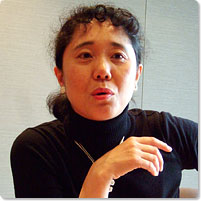
Harue Yamagata
Born in 1959, Harue Yamagata is a scholar of Greek tragedy, translator and professor of Nihon Univ. (Research Center). After completing undergraduate studies at Tsudajuku Univ. (English literature major), Yamagata completed the diploma course in the Drama Dept. of Canterbury University (UK). Received a doctor’s degree in drama at Waseda Univ. From 1987 to 90 she studied in Greece on a government scholarship at the University of Athens. Her books include Greek Tragedy: Between the Ancient and the Present and Guidebook to Greek Tragedy and Comedy among others. She is recipient of the 11th Yuasa Yoshiko Award (Translation, Adaptation Div.) for her translation of Electra.
Interviewer: Hideko Nagamine
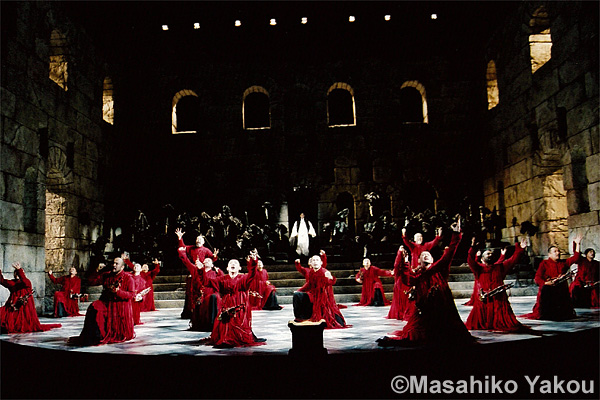
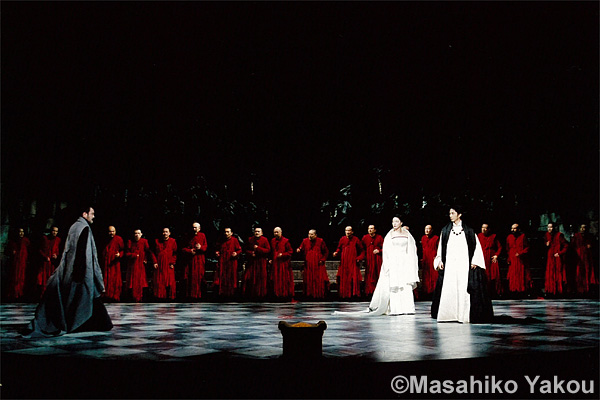
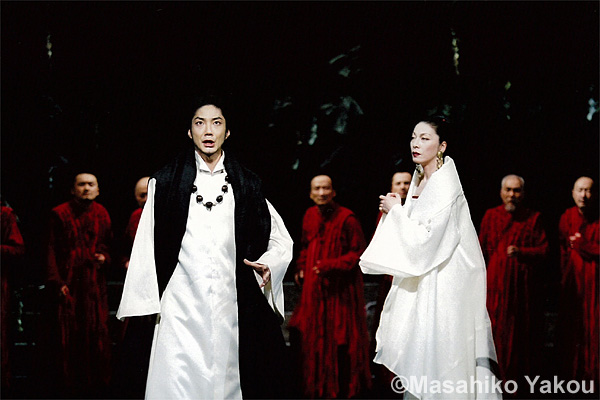
Oedipus Rex
Premiered in June. 2002 at Bunkamura Theatre Cocoon, re-staged in Tokyo and Athens in 2004
Playwright: Sophocles
Translation: Harue Yamagata
Director: Yukio Ninagawa
Cast: Mansai Nomura, Rei Asami, Kotaro Yoshida, etc.
Photo: Masahiko Yakou
(c) Bunkamura Theatre Cocoon
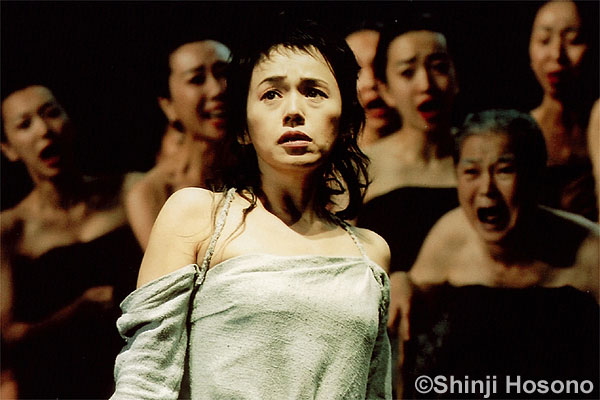
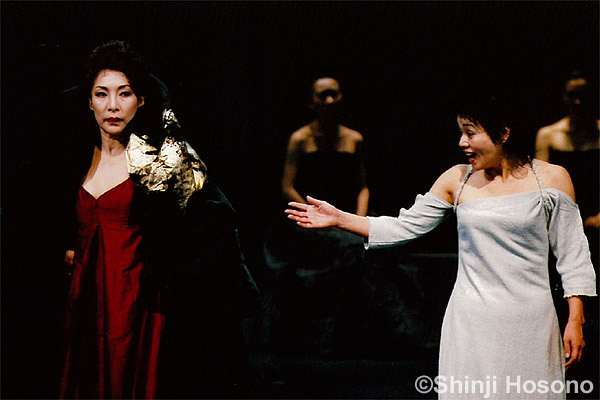
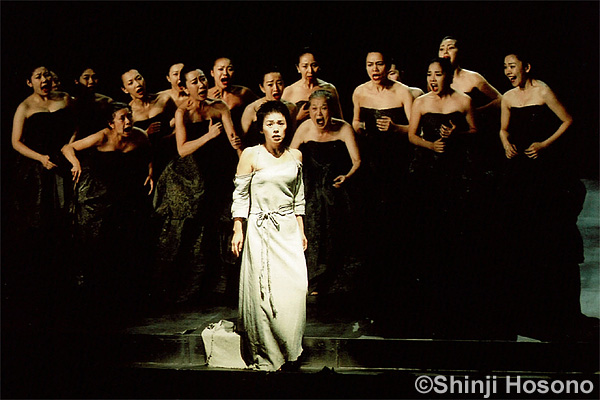
Elektra
September. 2003 at Bunkamura Theatre Cocoon
Playwright: Sophokles
Translation: Harue Yamagata
Director: Yukio Ninagawa
Cast: Shinobu Otake, Jun’ichi Okada, Kuriko Namino, etc.
Photo: Shinji Hosono
(c) Bunkamura Theatre Cocoon
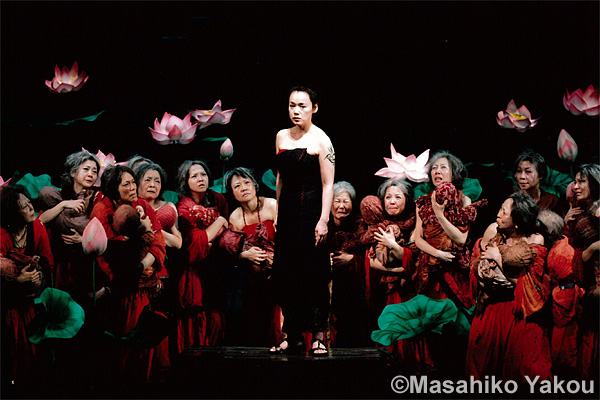
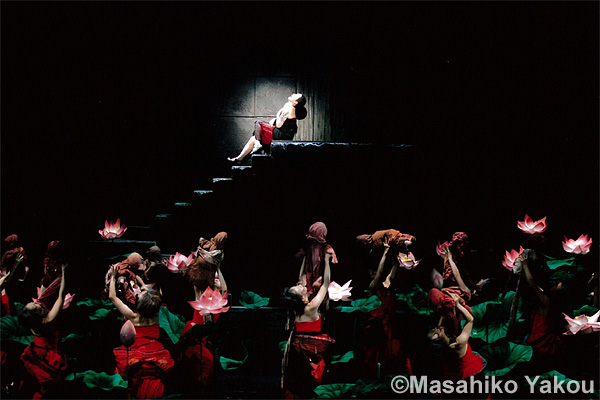
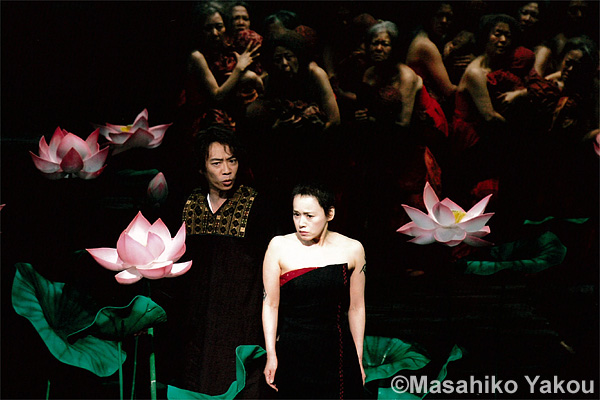
Medea
May, 2005 at Bunkamura Theatre Cocoon
Playwright: Euripides
Translation: Harue Yamagata
Director: Yukio Ninagawa
Cast: Shinobu Otake, Katsuhisa Namase, Kotaro Yoshida, etc.
Photo: Masahiko Yakou
(c) Bunkamura Theatre Cocoon
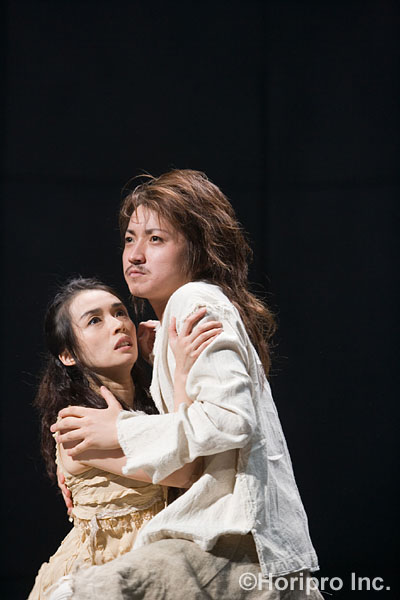
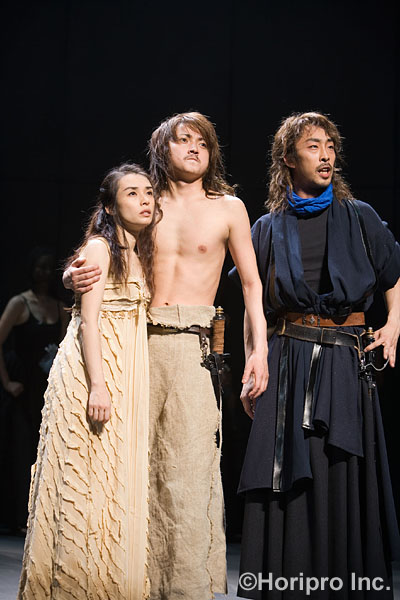
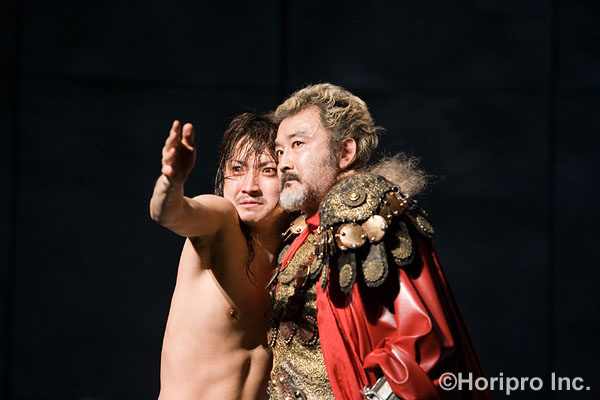
Orestes
Sep. – Oct. 2006 at Bunkamura Theatre Cocoon
Playwright: Euripides
Translation: Harue Yamagata
Director: Yukio Ninagawa
Cast: Tatsuya Fujiwara, Tomoko Nakajima, Yukiya Kitamura, etc.
Photo: Hirotaka Shimizu
(c) Horipro Inc.
Related Tags

